Seattle Seahawks linebacker Jordyn Brooks along with cheerleaders and the team mascot, Blitz, visited Auburn School District schools in support of National School Breakfast Week.
Just before the buses arrived at Chinook Elementary School on the morning of March 8, Blitz and the cheerleaders got ready behind the cafeteria doors.
At around 9 a.m., one by one the buses began arriving and students were surprised by Blitz and the cheerleaders as they walked into the cafeteria to get their breakfast.
After all the students passed through and went to their classrooms, Blitz and the cheerleaders met up with Brooks and went to visit a couple of classrooms to talk about the importance of eating a good breakfast.
“It’s important to eat breakfast so you guys can be alert and energized in the morning and ready to learn,” Brooks said. “You’re young right now so you might not understand, but when you get older you’ll understand how important breakfast is.”
After talking with the class for a few minutes, Brooks, Blitz and the cheerleaders headed out to visit Dick Scobee Elementary School.
National School Breakfast week takes place during the second week of March and is intended to raise awareness and increase student participation in the federal school breakfast program. The program reimburses states that operate nonprofit breakfast programs in schools, according to the USDA.
Every day, millions of children across the country get their breakfast from school. In the 2019-20 school year, approximately 12.6 million low-income students received breakfast from school, according to the Food Research and Action Center.
However, during the COVID-19 pandemic, participation in the program dropped significantly and is slowly recovering, so raising awareness is important. On average, students who get their breakfast from the school breakfast program eat a breakfast with a higher nutritional value than students who get their breakfast from other sources, according to the USDA.



